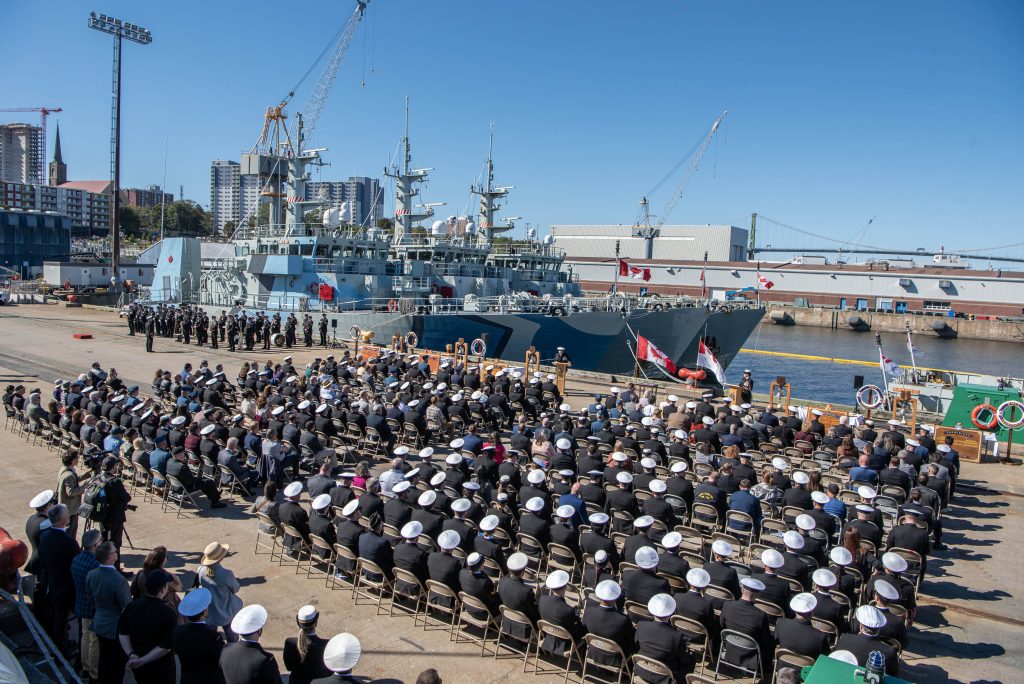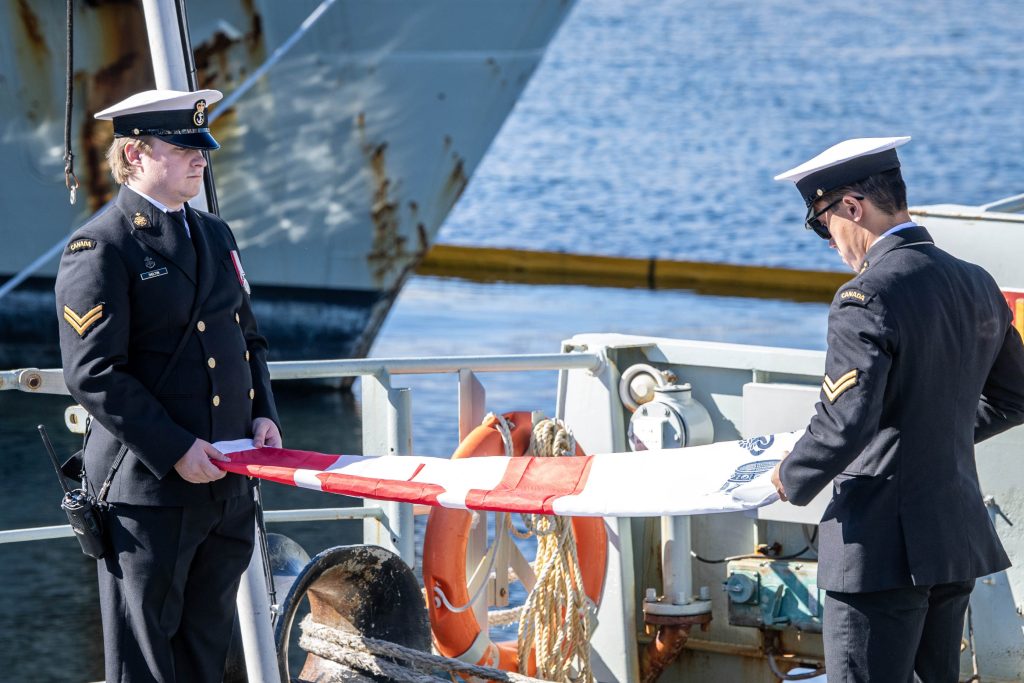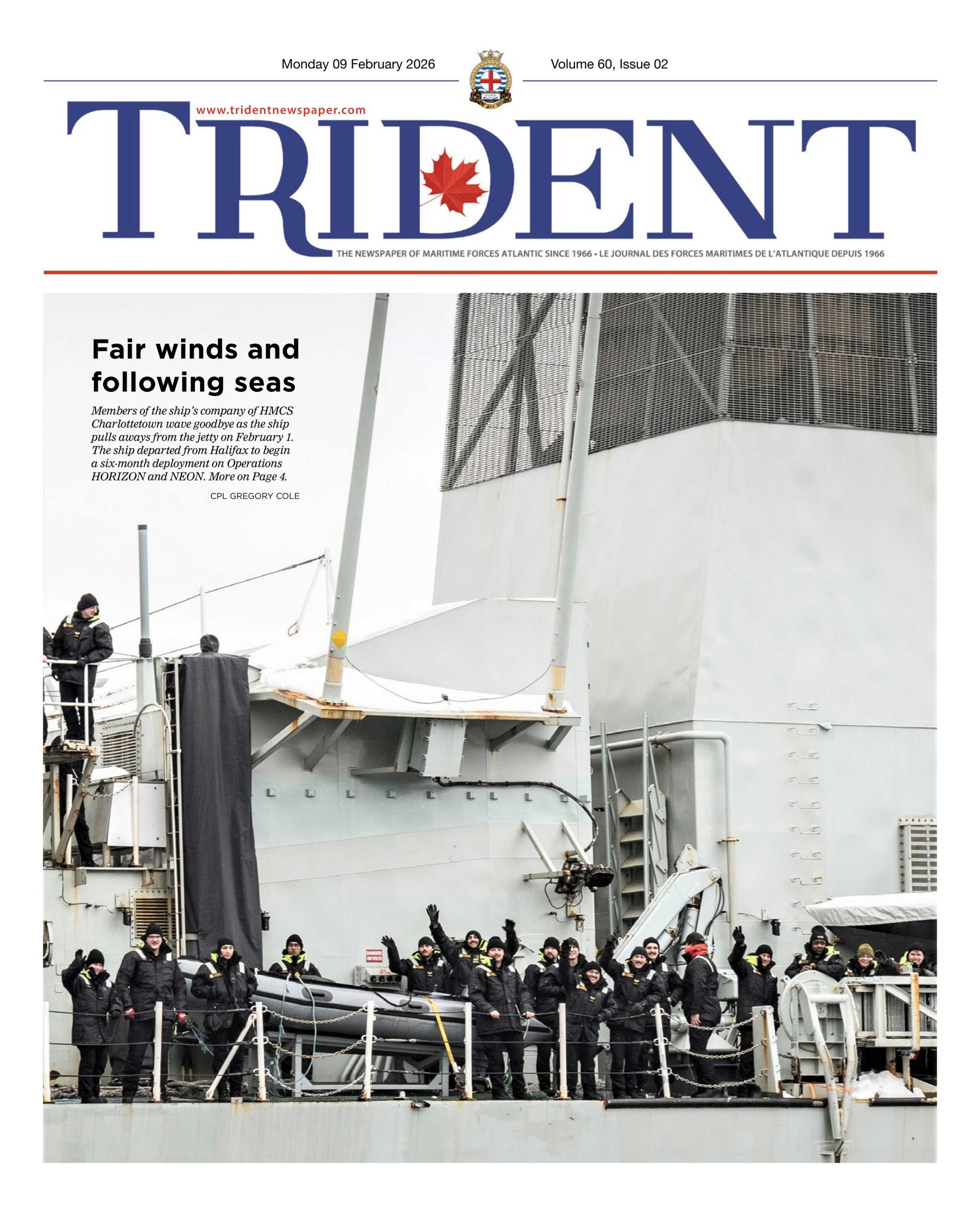
MONA GHIZ
‘Small but mighty’ Kingston-class celebrated as five ships paid off
By Nathan Stone,
Trident Staff

MONA GHIZ
After over two decades of serving Canada at home and abroad, while helping train generations of Naval Reservists, five of the Royal Canadian Navy’s (RCN) Kingston-class ships are sailing off into the sunset.
A paying off ceremony for His Majesty’s Canadian Ship (HMCS) Kingston, HMCS Glace Bay, HMCS Shawinigan, HMCS Goose Bay and HMCS Summerside was held on October 3 at His Majesty’s Canadian Dockyard, marking their official decommissioning.
“These five ships have been at the forefront of the fleet’s operational commitments and have accomplished their missions in an exceptional way,” said Commodore (Cmdre) Jacob French, Commander Canadian Fleet Atlantic, speaking at the ceremony.
All 12 of the Kingston-class ships are reaching the end of their service life. HMCS Brandon, HMCS Yellowknife and HMCS Saskatoon were formally decommissioned at Canadian Forces Base Esquimalt on September 29.
Cmdre French praised the Kingston-class as small ships that have made a big impact on the RCN.
“They represent a legacy of service, a legacy of small but mighty, a legacy of Ready, Aye, Ready… The ships may create a small wave, but that wave ripples through the generations of inspired sailors,”
During their service lives, the retiring Kingston-class vessels deployed on a variety of missions, including coastal patrols, surveillance, anti-drug and anti-piracy operations, minesweeping, search and rescue and more. They were also a regular sight on domestic and international operations such as Operation Caribbe, Operation Projection, and Operation Nanook.
“One of the most transformative effects of the Kingston-class was how its introduction changed the Naval Reserve,” said Rear-Admiral (RAdm) Michael Hopper, the Canadian Armed Forces’ Chief of Reserves.
“These ships were the first in our fleet designed with the explicit intent of integrating reserve sailors into full-time operational service. They opened the door for updating and modernizing reserve training, revitalized the reserve force and gave thousands of citizen sailors the opportunity to serve at sea.”
The term “paying off” comes from an old Royal Navy practice of paying a crew’s wages only when a voyage ended. The RCN borrows the term to describe the official decommissioning of a ship. It is marked by the lowering and removal of the naval jack, ensign, and commissioning pennant, followed by the crew’s final departure. Afterwards, the vessel ceases to be referred to as His Majesty’s Canadian Ship.
Due to the RCN’s demanding schedule, there was no final crew departure for the five ships at the ceremony, as the crew of each vessel had already been reassigned.
The Kingston-class ships were the result of the Maritime Coastal Defense Vessel project initiated in the late 1980’s. The project sought to replace the RCN’s Cold War era Bay-class minesweepers with a multi-role ship that was also suitable for training reservists and coastal patrol duty.
Production of the 12 Kingston-class vessels began in 1993 at the Halifax Shipyard. The lead ship, HMCS Kingston, was commissioned on September 21, 1996. HMCS Summerside was the final ship to be built; it was commissioned on July 18, 1999.
The Kingston-class is not yet totally retired. Four of the ships, HMCS Moncton, HMCS Yellowknife, HMCS Edmonton and HMCS Nanaimo remain in service. The four ships will all be based on the East Coast going forward, consolidated under Maritime Forces Atlantic. HMCS Nanaimo recently made its final departure from Esquimalt and is currently en route to Halifax.
The RCN says the remaining ships will continue to support operational commitments until they are gradually paid off in the coming years. HMCS Yellowknife is scheduled for decommissioning in 2026, followed by HMCS Edmonton in 2027 and HMC Ships Moncton and Nanaimo in 2028.






